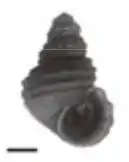Margarya monodi
Margarya monodi is a species of large operculate freshwater snail, an aquatic gastropod mollusk in the family Viviparidae, the river snails.[4]
| Margarya monodi | |
|---|---|
 | |
| Shell of Margarya monodi. | |
| Scientific classification | |
| Kingdom: | |
| Phylum: | |
| Class: | |
| (unranked): | |
| Superfamily: | |
| Family: | |
| Genus: | |
| Species: | M. monodi |
| Binomial name | |
| Margarya monodi | |
| Synonyms[4][5][6] | |
| |
This species appears to be endemic to Lake Dianchi, in Yunnan Province, China.
These snails are collected commercially and used as medicine and food.
Threats
This snail is no longer abundant as it was before the 1980s, when fishermen took as much as 20 kg a day per person. Currently during the open fishing season the fishermen can find only 2 kg a day. In 1999 there were still snails in the eastern part of the lake but by 2009 the snail was found only in the 50 km² of the lake that is near the outflow.
Threats to this snail species' survival include organic and inorganic pollution, overharvesting and some introduced species of predatory fish.
References
- "The IUCN Red List of Threatened Species 2009 update. Mollusc Facts". 5 pp., accessed 14 September 2010.
- Di L., Jiang Y., Aldridge D. & McIvor A. (2008). Margarya monodi. In: IUCN 2010. IUCN Red List of Threatened Species. Version 2010.3. <www.iucnredlist.org>. Downloaded on 14 September 2010.
- Dautzenberg P. & Fischer H. (1905). "Liste de mollusques récoltéspar M. Mansuy en Indo-Chine et description d'espècesnouvelles." Journal de Conchyliologie 53: 343-471. page 423, fig. 1.
- Bouchet, P. (2014). Margarya monodi Dautzenberg & H. Fischer, 1905. Accessed through: World Register of Marine Species at http://www.marinespecies.org/aphia.php?p=taxdetails&id=758792 on 2014-12-10
- He, J (2013). "A conchological review of Margarya-complex (Gastropoda: Viviparidae)". Shell Discoveries. 2: 2–15.
- Zhang, L. J.; Chen, S. C.; Yang, L. T.; Jin, L.; Köhler, F. (2015). "Systematic revision of the freshwater snail Nevill, 1877 (Mollusca: Viviparidae) endemic to the ancient lakes of Yunnan, China, with description of new taxa". Zoological Journal of the Linnean Society. 174 (4): 760–800. doi:10.1111/zoj.12260.
